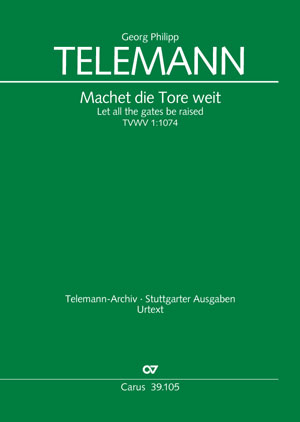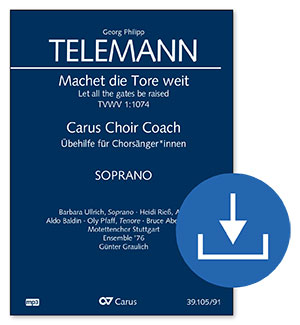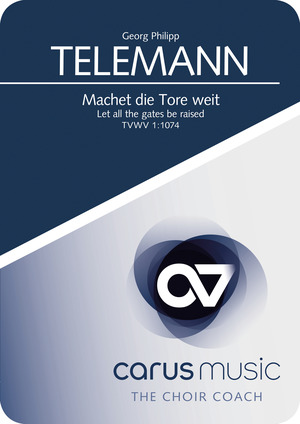
The Advent cantata Machet die Tore weit has long been one of the most frequently performed of Telemann’s
sacred works. Among the copies of this cantata which have been handed down is a copy by J. S. Bach which
bears testimony to the high respect he paid to his then more celebrated colleague from Hamburg: It is a copy of the score in the hand of the Thomaskantor which was made for a performance in Leipzig on Avent Sunday in 1734 (therefore during the same period as the first performance of Bach’s Christmas Oratorio). Of the four
solo singers the soprano and bass, each of whom has an aria, are indispensable. The brief alto solos in the opening chorus can be sung by a member of the choir, and the tenor recitative can be sung by the soprano soloist.
sacred works. Among the copies of this cantata which have been handed down is a copy by J. S. Bach which
bears testimony to the high respect he paid to his then more celebrated colleague from Hamburg: It is a copy of the score in the hand of the Thomaskantor which was made for a performance in Leipzig on Avent Sunday in 1734 (therefore during the same period as the first performance of Bach’s Christmas Oratorio). Of the four
solo singers the soprano and bass, each of whom has an aria, are indispensable. The brief alto solos in the opening chorus can be sung by a member of the choir, and the tenor recitative can be sung by the soprano soloist.
Purchase
Additional product information
Contents
-
Composer
Georg Philipp Telemann
| 1681-1767Telemann's extremely rich compositional output, the fruits of three quarters of a century's work, encompasses almost all genres of music; in his vocal works it ranges from songs with basso continuo accompaniment to chamber and church cantatas, and to opera. In his own assessment, church music played a central role in his output; he alone probably composed over 1,600 church cantatas, as well as cantata-style funeral music settings (such as Du aber, Daniel, gehe hin), psalm settings (for example, Deus judicium tuum) and oratorios. Throughout his works Telemann showed himself to be a progressive composer, open to new trends and keen to experiment whilst exploring new directions; not without reason was he called a forerunner of classicism. However, his compositions constitute only a part of his importance to music history: as a music publisher, the author of publications for teaching, the director of middle-class music societies and initiator of public concerts, he made a considerable contribution to creating the preconditions for the support of the musically-educated middle classes in the ensuing era of music. Personal details
-
Editor
Traugott Fedtke
| 1909-1988
-
Editor
Klaus Hofmann
| 1939
-
Continuo realization
Traugott Fedtke
| 1909-1988
-
Translator
Jean Lunn
Frequent questions about this work
 There are no questions and answers available so far or you were unable to find an answer to your specific question about this work? Then click here and send your specific questions to our Customer Services!
There are no questions and answers available so far or you were unable to find an answer to your specific question about this work? Then click here and send your specific questions to our Customer Services!








